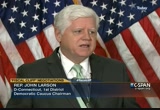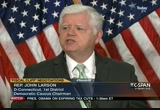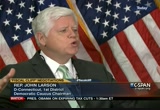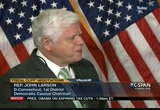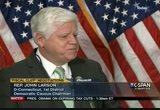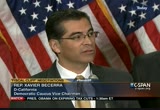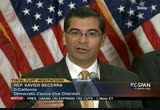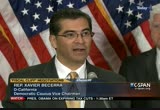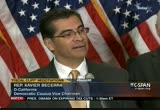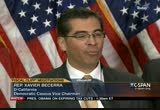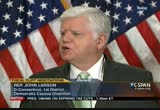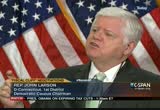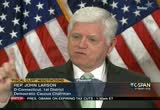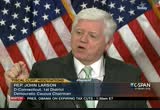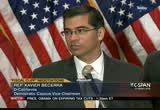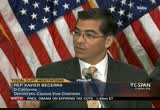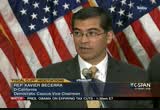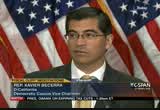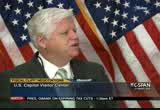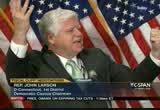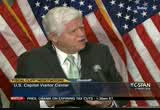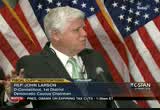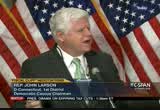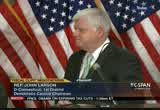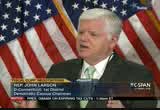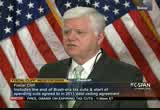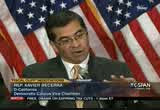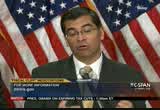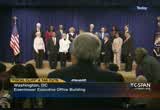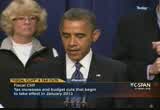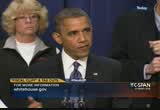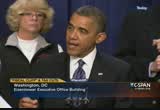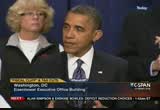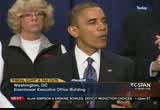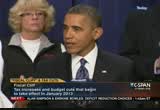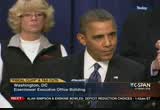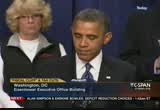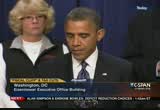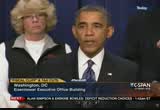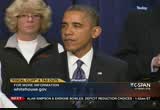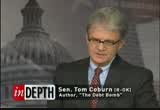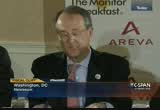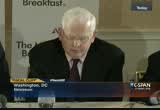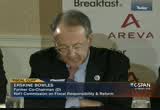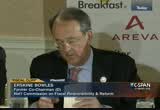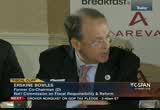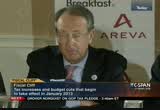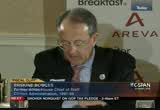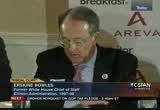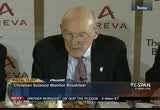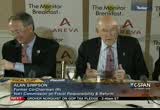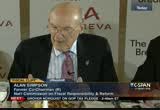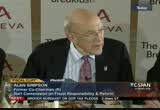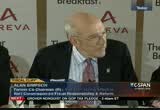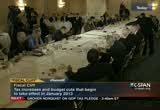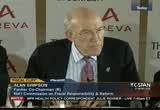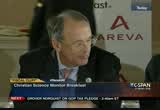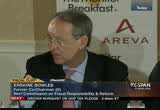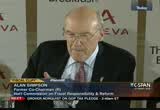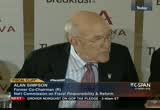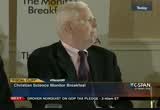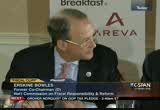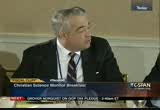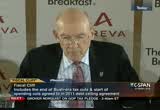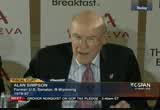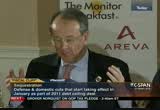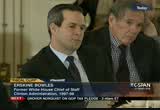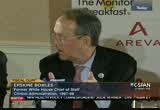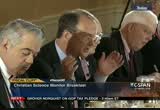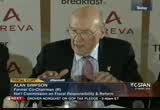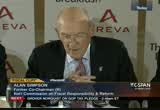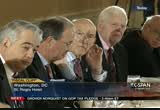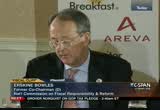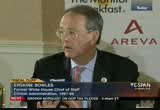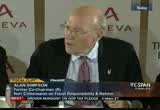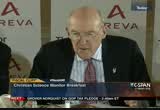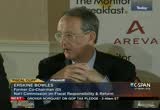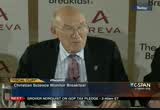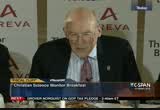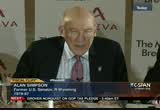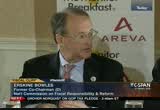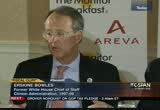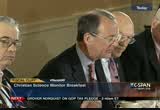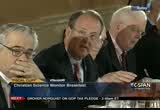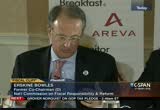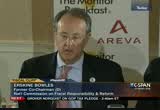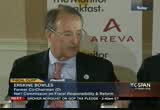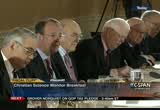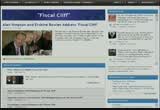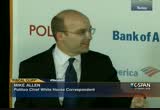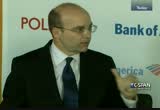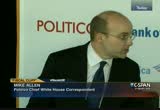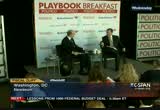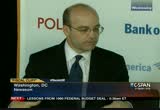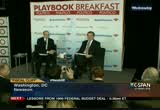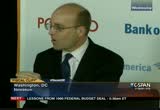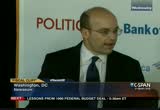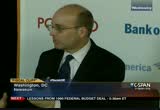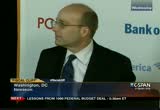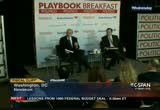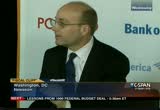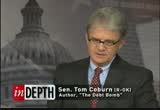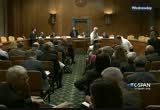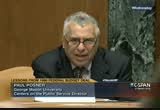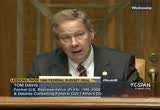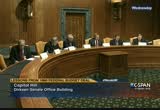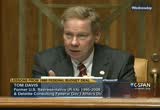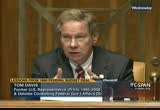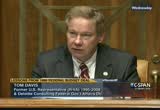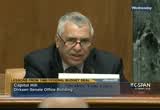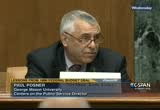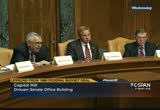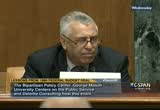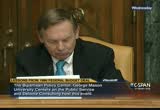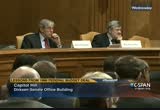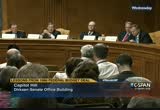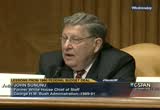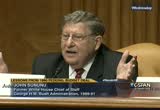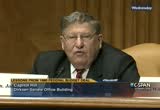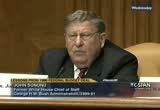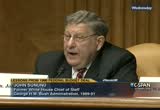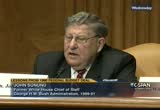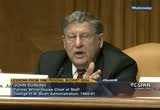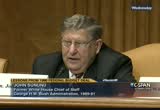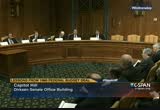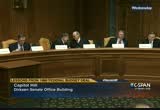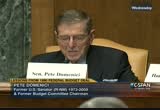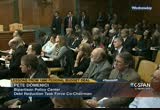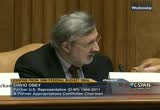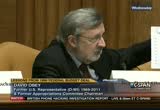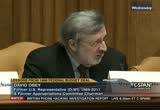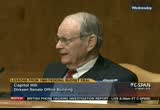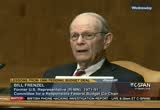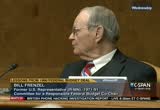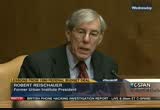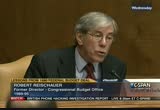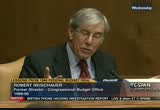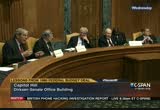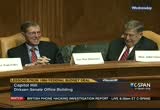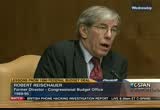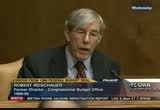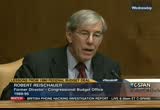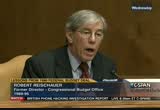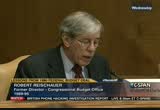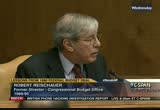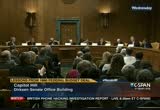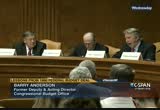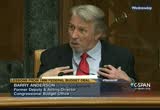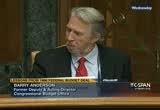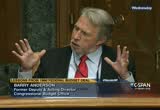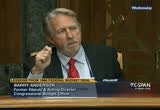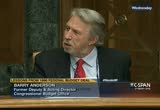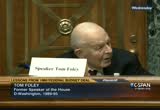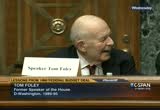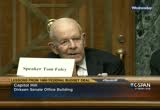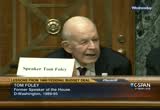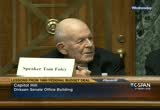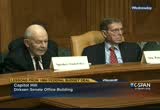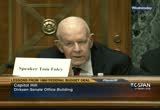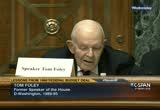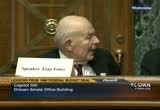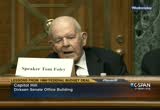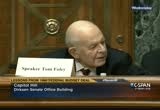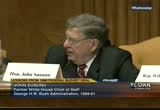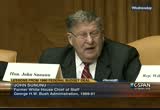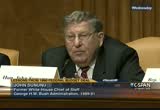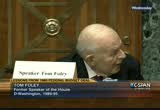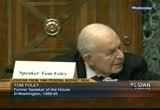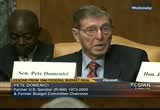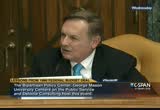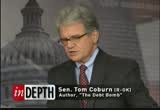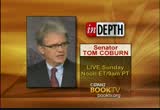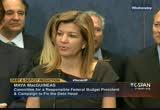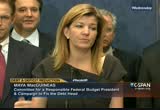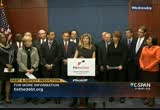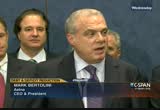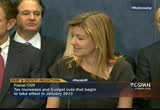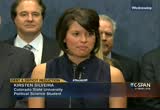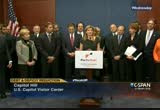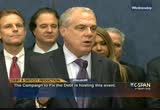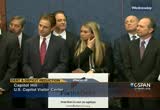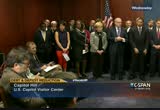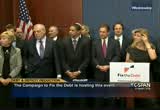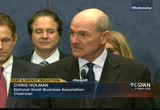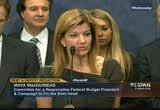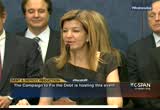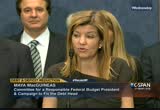tv Capitol Hill Hearings CSPAN November 29, 2012 1:00am-6:00am EST
1:00 am
infrastructure in the northeast -- we are still reeling from the effects of sandy. the pleas of governors like tie, allcuomo, and chrsite are calling us to focus on infrastructure not only needed in a devastated northeast but to understand the importance of infrastructure investment. clearly, people need to go back to work. that is something positive that we all agree on that can be done and should be done
1:01 am
but as we noticed today, there are no votes on the united states congress and the house of representatives today. we also agree, and emphasize this again, as did gene sperling -- everyone, and we mean everyone, should get $250,000 ineveryone -- and so that means that even billionaires get that first $250,000. and everyone is in agreement -- the republicans do not want to see the middle class go without this tax cut. so where we disagree, let us push that off. where we agree, let's embrace. further, we discussed again the long term effects of our deficit, which are directly tied to health care -- the work that has been done in the congress as it relates to constructing and exchange that will take place in 2014 and go
1:02 am
into effect, and the tools that we provided a initially on a concept that by its very nature was one designed by republicans, that there is ample room for us to tackle the unbelievable rise in cost of health care to 17% of our gross domestic product by focusing on dropping those costs. most recently the president of aetna said very clearly -- not only if we drop those costs would we make health care more affordable, we would also deal with balancing our national debt. so these are all very constructive areas that we all should agree to.
1:03 am
that the american public wants us to pursue. we remain optimistic because of the way the president has gone out there and is selling this concept, not only in white house public. i commend leader boehner, speaker boehner, setting the appropriate tone in the conference. we know there are differences in both the caucus and the conference, but it is the common thread that should unite us and allow us to move forward in a way that will both put the country back to work, provide for deficit reduction, and deal long term with the concept of debt reduction while allowing americans to be fully insured and covered under their health care. that is why we are optimistic and we would like to see more work effort here, but we remain
1:04 am
optimistic as we go forward. tomorrow we will have another caucus meeting, and election. it will be my high honor at that point to turn the gavel over to xavier becerra, who will be the next chairman of the democratic caucus. >> thank you very much. it will be a pleasure tomorrow if i am successful to succeed all the work you have done over the last four years as our chairman. i very much look forward to trying to come close to the success you have had in being the chairman of our great democratic caucus. i want to reiterate what chairman said -- it was a great meeting. folks are back after
1:05 am
thanksgiving. we wish everyone in america a great thanksgiving. it was tough for some folks from hurricane sandy, but we hope every single american in this country found a way to be able to celebrate thanksgiving with family and friends and lovedwe had a group of members, including new members, who were very excited and optimistic. the chairman said we leave the room truly believing that we can get this work done before december 31. we leave the room today believing there is no reason why we cannot get that done. just a couple points -- a bit of context. four years ago, if he checked the records, you will find four years ago in the month of november america bled 790,000 jobs. 790,000 americans lost their jobs four years ago. last month, the jobs report --
1:06 am
180,000 new jobs created in this country. not as many as we want, but we're not losing jobs. we're certainly not hemorrhaging hundreds of thousands of jobs that we were four years ago. we are on the move, making progress, but as the president keeps and, we have to do more. this is not the time to put your foot on the break of economic recovery. we would hope that our republican colleagues would join with us and do exactly as our chairman just said. and that is where we have agreement. let's move forward. there is clear agreement with democrats and republicans that we have near-unanimous if not unanimous support for trying to move forward on making sure the middle class is not impacted by the december 31 deadline. we can then deal with the 2%
1:07 am
wealthiest americans and how we deal with them in terms of the tax rates. but first, let's take our foot off the economic brake and let this economy continue to build. it seems a little disorienting and ale disconcerting to hear that there may be some people in this congress who put their pledge to a special interest ahead of their pledge of allegiance to this country. and while we are beginning to see some cracks in that cement block that is the special interest group that has gotten these republican members to sign these no-tax pledges, there are not that many. you hear a high ranking republican in the house talking about telling his colleagues to join with president obama to move forward in preserving the tax rates for the middle-class. as the chairman just said, for
1:08 am
everyone, including warren buffett, ross perot -- they would get tax relief for the first $250,000 of their income as well. you hear some republicans calling this pledge handcuffs that keep them from moving forward. we would hope in the short periodically have before december 31, we would not let a pledge to a special interest supersede the pledge of allegiance to make to our country. finally, once again, the american people are way ahead of the politicians. the american people by two- thirds agree with president obama that we must have a balanced approach to solving deficit issues and moving toward economic growth and job creation. two-thirds. if they were a vote by the american public today, there would be a landslide in favor of providing for the 2% wealthiest americans to pay a little more in taxes to help them get to the point of a balanced approach.
1:09 am
a landslide victory. including republicans in america who agree with that. there is no reason to delay. we think we can move forward. the reason there is optimism coming out of this caucus that we can get this done is because the reality is it is not rocket science -- we can get it done. mr. chairman, whether it is our current chairman, john larson, or our future chairman -- whoever gets to lead this caucus knows we have got an enthusiastic group of committed representatives of this country ready to get the job done. >> questions? >> congressman, if republicans are willing to step up and raise revenue, will house democrats provide votes to cut benefits to programs like medicare and medicaid? >> let me say that clearly, as gene sperling was sent today,
1:10 am
the president is willing to look at what they're going to put forward in terms of revenues, but that has not been forthcoming, shall we say. with the president has been very clear is in terms of the impact on beneficiaries and beneficiaries are the people who are the recipients of medicaid, medicare, and social security -- we believe at most would agree that social security is not responsible for the deficit and should not be on at the table for discussion. with regard to the so-called entitlements -- i come from hartford, connecticut. this is a matter of insurance and it is a matter of actuarial assumptions. and i think when you look at
1:11 am
things in terms of insurance and not entitlements, people were i come from say, wait a minute, i paid for this. that is my insurance that i paid for. now, there are actuarial assumptions you can make -- life span, various elements, wellness, exercise, preventative care. a number of things built into the affordable care act that will allow us to reduce costs significantly. a perfect example -- reuters said in a 2009 more than $750 billion annually in inefficiencies, lack of
1:12 am
coordination, waste, and fraud. for the first time in the nation's history, medicare crime superceded drug and prostitution crime. a report by reuters. chairman of aetna said, if there is $750 billion annual in terms of savings that could be achieved with the appropriate tools we have put forward, that does two things. it lowers the cost of health care and lowers the national debt. that is the driving force. so those are the parameters where there can be -- i do not believe republicans want to see their beneficiaries, their recipients, in their communities lose their benefits. or be denied the benefits in this time. i think there is a common ground for us to work under that is both actuarially sound and focuses on insurance as opposed to an entitlement.
1:13 am
>> let me add to that -- i say this having served on bowles- simpson fiscal commission that was appointed to deal with this deficit and debt crisis. i was fortunate or unfortunate enough to serve on the so-called super committee in congress to deal with this as well. and each time i got to serve on those -- everything should be on the table. wewe're smart and sensible, will leave on the table to help us reduce the deficits the things that drove us into these deficits. as the chairman just said -- social security has never contributed one penny to these deficits. why to cut the benefits of seniors on social security to pay for the misspending and bad ideas of previous congresses, i
1:14 am
do not understand. that is what we are adamant about social security -- use it to buy down a debt created by other things? no. on medicare, if you all just take a close look at the record, a lot of democrats lost their seats because of republicans politicizing this issue. democrats have already come to the table $700 billion in savings in medicare already. we have reformed medicare through be affordable care act, and much of it is doubling to play out. $700 billion -- that is a lot. i have not seen any republicans come forward with a proposal that saves you $700 billion. we did that without having to cut any benefits for beneficiaries who earned as benefits. that was the beauty of the reforms we passed -- we found ways to extract savings, principally from waste and fraud, people out there are
1:15 am
going after them. the chairman said there is a lot of money out there we can save. we saved over $700 billion. in the sequester, medicare is in the sequester. there will be savings from medicare in the sequester, but once again at the insistence of democrats, the savings will not come at the expense of seniors and other beneficiaries on medicare. medicare, has it been on the table? absolutely. but we have been smart with this -- we do not go after benefits for those who earn them. we try to make sure we get rid of the waste and overspending by those who are profiting from medicare. and you can do that. this -- we are willing to put discussion. but the moment you want to privatize social security or voucherize medicare or block medicaid -- we want to strengthen those programs. not let them die. if there is a clear difference
1:16 am
the between republicans are willing to cut benefits for seniors and -- we can find savings in medicare, but we do not have to cut the benefits senior's earned when they paid for the medicare there are now receiving. >> did mr. sperling make any of eligibility for medicare? >> we did not get into specifics. one of the things that he prefaced the comment with -- our caucus is always prone to ask a very direct and specific questions, as is the press. he said, i am not going to come up because of the open nature of this discussion and what is going on, the sensitivity, no lines are being drawn in the sand. much as the chairman said, everything was on the table for discussion. the context and parameters as more eloquently outlined by our vice chairman. >> one of the caucus members tweeted that a discussion about why some of the republican proposals on bringing in tax revenues do not add up, the
1:17 am
math does not work -- can you explain what he talked about? >> i think that was more of a discussion about how the republicans keep talking about doing something other than asking the wealthiest 2% to contribute more. we have never seen a proposal that actually adds up to anything. the question was posed, have you seen anything that adds up? what are the numbers? we do not know -- it should be one of those things for we ask them to show us how they add up savings, how they would do that. we all know that the moment they start talking about going after some of these tax programs like the mortgage interest deduction, a charitable contributions, state and local tax deductions -- you are hitting middle-class americans. we're all still waiting for
1:18 am
republicans to indicate how they would find that level of savings the president has called for by asking the wealthiest 2% of americans to contribute a little bit more. >> specifically, what would you guys cut? >> are you asking for savings or cuts? you are trying to save. >> i guess cuts -- are any entitlement programs on the table? >> those have been on the table through the sequestered. over $2 trillion there. i think when you say, is there anything on the table you are willing to cut, the answer is yes, and very specifically, starting with reuters, there is $750 billion out there that needs to be extracted. what accounts for the rising
1:19 am
cost in our deficit? what is the one area we need to focus on? health care. why is it so? it is at 17% of gross domestic product. the rest of the industrialized world who has universal health care is between 7% and 8%. switzerland is that 10%. switzerland has a private sector system, not unlike ours. except they have universal coverage and they do that at 10% of gdp. so yes, here is where the cuts need to be made -- here is where they need to come from. if you are at 17% of gross domestic product because of the cost of medical devices, pharma, insurance, hospitals, doctors, and the trial bar, that is the area you need to take a look at and reduce those costs
1:20 am
through cuts or changes in legislation that would both lower those costs, that is what he was talking about, what reuters was talking about. both makes health care more affordable and accessible and also lowers the national debt. the question is, for us, for democrats -- this is insurance that beneficiaries have paid into. this is something that they live on. you know that an average female adult on social security earns between $12,000 and $14,000 a year. barely able to live on that -- clearly in a state like mine,
1:21 am
very difficult to live on that also, the services that are provided for people who receive medicare and medicaid -- i just lost my mother. i saw not only what she went through, but also what my neighbors and friends and family in that similar health care facility were experiencing. i know the importance and the value of insurance. when people say, you are cutting -- it is couched as though it is an entitlement. do not tell them it is an entitlement. it was not something they saw deducted out of their paycheck every single week. add to that, my father's pension -- he never live long enough to collect it. everything he paid in all went in to go and pay for this, to
1:22 am
pay for my mother's final days here on earth. thank god that we have a social safety net like that. and we do because of our experiences in the last century. social security during the depression, and then some many seniors bankrupt and because of lack of health care -- medicare and medicaid. now, with obamacare, we have all the tools we need here. let us work. here is our message -- obamacare is really romneycare, adopted on the model of massachusetts. it will open up an exchange that allows for competition and allow for us to take what is the very best of government programs, what is the very best in private sector, and what is the very best from entrepreneurialism and
1:23 am
innovation in our academic sector to drive down the cost, provide greater access, focus on wellness and individual responsibility and, we have got something that if we were together, becomes the greatest system in the world. in our reach. it is all right before us. it takes a collection of the best thinking and the best ideas from not only both parties, but from all sectors of our economy and our country. that is where we need to focus on. but when you are staring at $750 billion annually, that clearly is the place where you are going to look to cut instead of on the backs of beneficiaries who have paid into an insurance program.
1:24 am
>> you talked about how optimistic you are heading out of the meeting, but i have not personally heard any new information that may be optimistic about the chances of a deal. did gene sperling convey to you any particular piece of intimation that was the cause for that optimism? >> yes. if you go back, and i think xavier was right to say, look a context. go back to july of 2011 and as the sessions were taking place in the white house, with respect to the fiscal cliff, subsequent meetings that took place in the select committee. i think there is far greater optimism because there is a true crisis on hand.
1:25 am
everything that has been compressed into time and is awaiting before us. as he pointed out, comments today were very encouraging. the president remains very focused on this. he is taking that message out. i think it will take a matter of making sure that the business community ways in, that the academic community, the labor community, and the public in general does everything at stake here. and i do believe that congress will respond in a positive way. we all have our concerns. you have heard them outlined today by the vice chair himself. i am sure the republicans have their concerns as well. but i do think and remain optimistic that there is a great opportunity here for us to succeed.
1:26 am
not by moving away from the core values that we stand for, but by embracing what we all now we agree on. >> can i add real quickly, you had to be in the room, first, because you have to see the enthusiasm that is in there. a lot of it is driven by these new members to have a get it done attitude. i do not think they look at this as a place that cannot work -- they cannot work. well over the last two years many of us experienced this morass where we would watch and wait for republicans to lead and they could not get there. they always needed democratic votes to pass the bills -- this new crop of elected
1:27 am
representatives believes we will get something done. i think gene sperling did a clear job of setting the landscape we face for the next five weeks. not that he gave a road map, but the landscape is very clear. the great thing is because it is arithmetic and not rocket science, you can see the road, how you get there. and perhaps the reason i at least feel very optimistic is that i think the president has really gelled on what he wants to do. because of that and because he campaigned on this and won an election, i can not see has the force of the american people behind him, as all the polls keep showing. two-thirds approaches balanced approach against the republican approach. more than 60% support asking the wealthiest 2% to pay a little more on taxes. having been on these committees to come up with a solution, there are only so many maps you can come up with that really
1:28 am
work. so the smart, sensible, balanced approach -- it is in front of us. that we are starting to see what we used to call republican trickle-down economics -- maybe this is trickle-down politics. you see trickles of republican starting to break away from the special interest pledge to grover norquist -- maybe on the part of republicans to participate in a balanced plan that gets us where we need to go. >> thank you all. >> president obama urged college -- urge congress to extend tax cuts. he spoke at the eisenhower executive office building for about 10 minutes. it travels to pennsylvania later this week to talk about taxes and the economy.
1:29 am
>> thank you very much. everybody please have a seat -- except you guys. [laughter] good morning, everybody. there has been a lot of talk here in washington about the deadlines we are facing on taxes and deficits. these deadlines are going to be coming up very soon in the coming weeks. but today's important because i want to make sure everybody understands that this is not just about numbers. it is a set of major decisions that are going to expect millions of families all across this country in very significant ways, and their voices, the voices of the american people, have to be part of this debate. so i asked some friends of mine to join me, some folks from here in the area. our ultimate goal is an agreement that gets our long term deficit under control in a way that is fair and balanced. that kind of agreement would be
1:30 am
good for our businesses, our economy, our children's future. i believe both parties can agree on a framework that does that in the coming weeks. my hope is to get this done before christmas. but the place where we already had complete agreement, right now, is on middle-class taxes. we have a two choices -- if congress does not act, every family in america will automatically see taxes go up at the beginning of next year. every family in america will see their taxes go up starting january 1. a typical middle-class family of four would see income-tax is go up by $2,200. $2,200 out of people's pockets. less money for buying
1:31 am
groceries, less money for prescriptions, less money for buying diapers. it means a tougher choice between paying the rent and paying tuition. middle-class families cannot afford that right now. by the way, businesses cannot afford it, either. yesterday i sat down with small-business owners to stress this point -- but economists predict that if taxes go up on the middle-class next year, consumers will spend nearly $200 billion last on things like cars and clothes and furniture. that obviously means fewer customers. that cuts into profits. that makes business is less likely to invest and hire, which means fewer jobs. that can drag our entire economy down. the good news is there is a better option -- right now, as we speak, congress can pass a law that would prevent a tax hike, the first $250,000 of
1:32 am
everybody's income. everybody -- that means that 98% of america and 97% of small businesses would not see their taxes go up by a single dime. 98% of americans, a 97% of small businesses would not see their income taxes increased. even the wealthiest americans would still get a tax cut, the first $250,000 of their income. it is not like folks who make more than that are not getting a tax break -- they are getting a tax break on the first $250,000 like everybody else. families and small businesses will be able to enjoy some peace of mind heading into christmas and the new year. it will give us more time next year to work together on a comprehensive plan to bring down our deficits, streamline our tax system, and do it in a balanced way.
1:33 am
including asking the wealthiest americans to pay a little more so we can still invest in things like education and training in science and research. i know some of this may sound familiar to you. we talked a lot about this during the campaign. this should not be a surprise to anybody. this was a major debate in the presidential campaign and congressional campaigns across the country. a clear majority of americans -- not just democrats, but also a lot of republicans and a lot of independents, agreed we should have a balanced approach to deficit reduction that does not hurt the economy and middle-class families. i am glad to see you have been reading the papers lately -- more and more republicans in congress seem to be agreeing with this idea we should have a balanced approach. both parties agree we should not raise taxes on middle-class families. let's begin our work with what we agree.
1:34 am
the senate has passed a bill that keeps income-tax is from going up on the middle-class families. democrats in the house are willing to vote for that same bill today. if we can get a few house republicans to agree as well, i will sign this bill as soon as congress sends it my way. i have to repeat -- i have a pen. i'm ready to sign it. [applause] so let's approach this problem with the middle-class in mind. the folks who are behind me. the millions of people across the country do they represent. the american people are watching what we do. middle-class families, folks working hard to get into the middle class, they are watching what we do right now. one thing i have learned, when the american people speak loudly enough, congress listens.
1:35 am
some of you may remember that a year ago during our last big fight to protect middle-class families, tens of thousands of working americans called, tweeted, and emailed their representatives asking them to do the right thing. sure enough, it worked. the same thing happened earlier when college students stood up and demanded congress keep rates low on their student loans. congress got the message loud and clear and they make sure that interest rates on student loans did not go up. the lesson is that when enough people get involved we have a pretty good track record of actually making congress work. that is important. this is our biggest challenge yet is one we can only meet together. in the interest of making sure that everybody makes their voices heard, last week we asked people to tell us what a $2,000 tax hike would mean for them.
1:36 am
some families told us it would make it more difficult for them to send their kids to college. others said it would make it tougher for them to cover the costs of prescription drugs. some said it would make it tough for them to make their mortgage. someone here from newport news -- she just wants to see cooperation in washington. she wrote, let's show the rest of the world we are adults and living in a democracy we can solve our problems by working together. that is what this debate is all about. that is why it is so important that as many americans as possible send a message that we need to keep moving forward. so today i am asking congress to listen to the people know sent us here to serve. i am asking americans all across the country to make your voice heard. tell members of congress what a $2,000 tax hike would mean to you. call your members of congress,
1:37 am
right in e-mail, post it on their facebook walls. you can tweet it using the hashtag #my2k. we figured that would make it easier to remember. i would like to insure the american people i am doing my part -- i am sitting down with ceo's, with labor leaders, talking to leaders in congress. i am ready and able and willing and excited to go ahead and get this issue resolved in a bipartisan fashion so that american families, american businesses, have some certainty going into next year. we can do it in a balanced and fair way, but our first job is to make sure taxes on middle- class families do not go up. we all theoretically agree on that, so we should go ahead and get that done. [applause] we get that done, a lot of the other stuff is going to be easier.
1:38 am
in light of spreading this message, i am going to be visiting pennsylvania on friday to talk with folks in small business there that are trying to make sure that they are filling their christmas orders. i will go anywhere and do whatever it takes to get this done. it is too important for washington to screw this up. now is the time for us to work on what we all agreed to -- let's keep middle-class taxes low. that's with the economy needs. that's what american people deserve. if we get this part of it right, then a lot of the other issues surrounding deficit- reduction in a fair and balanced responsible way are going to be a whole lot easier. if we get this wrong, the economy is going to go south. it will be much more difficult for us to balance our budget and deal with our deficit because if the economy is not strong that means more money is going
1:39 am
out, things like unemployment insurance, less money is coming in in terms of tax receipts. it makes our deficit worse. we really need to get this right. i can only do it with the help of the american people. so tweet using #my2k or email, post it on a member of congress's facebook wall. we do not have a lot of time here -- we have a few weeks to get it done. we could get it done tomorrow. optimistically, i do not think we are going to get it done tomorrow. but i tell you, if everybody here goes out of their way to make their voices heard and spread the word to their friends and families and co- workers neighbors, i am confident we will get it done. and you'll get america on the right track, not despite next
1:40 am
year but for many years to come. thank you very much, everybody. [applause] [captioning performed by national captioning institute] [captions copyright national cable satellite corp. 2012] >> tomorrow, treasury secretary tim geithner will meet with house speaker john boehner, pingree read and mitch mcconnell to talk about the so- called fiscal cliff. for more, go to our website, c- span.org. grover norquist of americans for tax reform talks about his no
1:41 am
tax increase pledge. that is at c-span.org. tomorrow on "washington journal ," julie rovner discusses the health care law. kem dixon looks at the payroll tax cut that was enacted in 2010 and if the white house plans to extend it. then a discussion of whether will be extended and the impact on our current economy. plusher e-mails, phone calls, and tweets. >> on 16 or 17 basis in the united states we have military run schools. the average cost per child per year in those schools is $50,000.
1:42 am
almost four times what the rest of the public education costs. the vast majority of our bases used public schools. we could take the money we are spending today, paying every public school system 14 dozen dollars per child, and save billions of dollars per year, and with the same or better outcomes. >> this weekend, you can talk with senator tom coburn about the fiscal cliff and the future of the republican party. the senator has written several books and reports, including the latest, "the debt bomb." live sunday at noon eastern on c-span2.
1:43 am
>> the authors of the simpson- bowles debt reduction plan talk about the fiscal cliff and choices facing congress. both alan simpson and erskine bowles have emphasized the need for revenue increases and entitlement reform. they have urged congress to reach a compromise. this is hosted by the "christian science monitor." >> here we go. our guests this morning are erskine bowles and senator alan simpson, co-chairmen of the national commission on fiscal responsibility and reform and co-founders of the campaign to fix the debt, or as the "new york times" called them this morning, the debt duo. their last joint appearance with us was in november of 2010. let me thank them both for coming back. we are all trying to fix the nation's fiscal woes. erskine bowles is president emeritus of the university of north carolina.
1:44 am
he also had a career in investment banking and venture capital. he came to washington in 1993 service director of the small business administration and was later named chief of staff to president clinton. alan simpson followed his father's footsteps into politics -- a u.s. senator. a law degree from the university of wyoming -- he was elected to the legislature in 1964 and the u.s. senate in 1978 where he served three terms and was elected as majority leader. leaving the senate, he has been director of the institute of politics at harvard and has practiced law. he is the author of the book "right in the old gazoo -- a lifetime of scrapping with the press." the breakfast is being underwritten by areva, a growing player in renewable energy and nuclear energy.
1:45 am
we thank them for their support. as always, we are on the record here. please no live blogging or other means of filing -- to give you some time to think. there is no embargo, but c-span has agreed not to air the video of the breakfast until noon today to give those of you who actually paid to attend the breakfast time to file. finally, if you'd like to ask a question please do the traditional thing and send me a subtle, nonthreatening signal. with that, thanks again from our supporters and viewers. >> he always goes first. the times article was right about one thing -- the debt duo, if you want to know what we are really like, you can
1:46 am
imagine sonny and cher. you can imagine which one i am. somebody once asked me, what was it like to be president of a university? i said it is like being ceo of a cemetery. you have lots of people underneath you. but nobody is listening. i thought i would update you -- yesterday i had a meeting with a group of ceo's that we took in to meet with the white house economic team and i subsequently had a meeting with president obama. i came away from those meetings feeling that these guys really
1:47 am
were serious about the debt. they were serious about reducing the deficit and the need to get on with it and had some sense of urgency. they were serious about raising revenue from higher income taxpayers, and that includes raising rates, with some flexibility there. they were serious about reducing spending and i would say to you, you have written a lot about the tax side of the equation. we need to read more about the spending side of the equation. they are equally important if we are going to get a balanced plan. they are serious about reducing spending -- that would include reducing spending on health care entitlements. they are serious about protecting the middle class -- you can really feel the president's passion on that. they were serious about restoring confidence in the short and long term so our
1:48 am
economy can grow and create jobs. i think the president has always been for a balanced approach come as alan and i have. our message to the president and the congress from day one has been the same -- that is the problem is real, the solutions are painful, and there is not going to be an easy way out of it. the only way to solve it will be a balanced plan with cutting spending and one without the other will not work. where do i think we are? i am really worried. i believe the probability is we are going over the cliff. i think that would be horrible. it would be devastating to the economy. it particularly bothers me, given the fact i believe this is the magic moment -- if we are ever going to get a deal
1:49 am
done, now is the time to do it -- we have got a republican speaker who has been willing to put revenues on the table. we have republicans and democrats who have said we ought to have a balanced plan. most importantly, to get something done here in town, you have got to have a crisis. we have got one. we have got a real crisis in this fiscal cliff. i think it would be insane. i think there is a one-third possibility we will get something done before december 31. you all know what it means if we do not. if we go over the cliff, i think you will see economic growth slowed by as much as 3%. i think that is enough to put
1:50 am
us back into recession. it will throw another 2 million people out of work. unemployment will go to 9%. i guarantee you the members of congress and the president's economic team will hear from the business community today that they are already slow in hiring. they are already slowing investing in capital expenditure. you will see this begin to affect the consumer, consumer confidence will erode. they do not think we would be stupid enough to do that. if we do go over the cliff, you will see the stock market really crash. we will get a downgrade in our credit from moody. i am for getting a deal done and done now.
1:51 am
and done right. where do i see the sticking points today? the president wants $1.50 trillion in revenues as part of his deal. in the revenue package, he wants to see rate increases on the top 2%. he has some flexibility there. he has a real reason why he wants to see the increase in rates. that revenue, when you get to the congress and talk about reducing tax expenditures, every university says, all you will take away reductions. republicans want less revenues and none from rates and all
1:52 am
from simplifying the code. the other thing that worries me about the sticking point is there have been no serious discussions yet about entitlements cuts reform except that the president has $325 billion in his budget of health care cuts. that is not enough to slow the rate of health care to the rate of growth of the economy. we can do this. i think we must do it. it is my generation that screwed this up. we have got to be the one who fix it. i include in my generation those of you who sit at this table. we have all got some. -- egg on our face. i do not care if you are republican or democrat, a reporter or a political person. the chances are about one-third
1:53 am
we will get it done in the lame duck. another third that we will go over the cliff. that will be bad because we already experienced a lot of those, you will see a number of those in the fourth quarter, the affect of what is happening. the real problem is if we go over the cliff and we do not get a deal right away, that is also a one-third probability that will lead to chaos. that is where i think it stands now. we will do whatever we can to bring about the honorable compromise it takes to get a deal done that makes sense for the country that faces in these changes so we do not disrupt economic recovery, but we do put our fiscal house in order. >> thank you. a great privilege and honor to do this. through the years, gene would
1:54 am
call and i was a freshman u.s. senator. when i got the call for the breakfast, i tell you, my staff was cheered that i had been able to get someone to listen. that is important. working with erskine bowles is a joy. he is smart. he is the last guy on earth to balance the budget of the united states when he was chief of staff for bill clinton. he knows the game. he is a master negotiator. >> you are wearing me out. [laughter] >> i am older than you. it is a great privilege. what i am fascinated by, when
1:55 am
this report came out, it was deafening. what are these guys doing? they are talking about revenues, spending cuts, and we sat in that room for seven months, and we come out with five democrats and five republicans and one independent, and if you do not think that is tough to get a range like that, you do not know anything about meetings or conferences or commissions. that is what we have got. across the street was the national association of realtors. i live with a realtor. she is not doing that anymore. she was a good lobbyist. she was tremendous. they just chuckled. home mortgage interest deduction? you guys are stupid. you will get rid of us.
1:56 am
we do not get rid of it. take it from $1 million to $500,000. give everyone else a 12% non refundable tax credit. helps the little guy that everybody talks about. everything we did is set this, get rid of that, just remember these tax expenditures that 20% of the american people use 80% of. guess who is using them. a guy who got the best lobbyist? the best deal? they went in and cut the deal. only 27% of the american people itemize. three-fourths of the american people never heard of these things. they take $1 trillion, $100 billion a year, and suck it out of the economy.
1:57 am
we need a stimulus. what the hell do you think a $1 trillion deficit is? once people wake up as to what is really coming, they will savage us and the commission. do not think these interest groups are not whoring it out right now. >> we came from the witness protection program. [laughter] >> it is tough to tell people what is going on when you have a presidential debate and during the course of that, no one asked anybody what they were going to do about the long-term solvency and social security for 75 years.
1:58 am
if you do nothing, which is the glorious recommendation of the aarp and other senior groups, that in the year 2031, you will waddle up to the window and get a check for 25% less. who is goofy enough to let that happen? plenty of people. you have never heard a single question, what will you do with a $16 trillion debt? a question i thought was rather significant. >> the word fiscal cliff was never mentioned by candidates or one of the moderators in the debates. every day, we have a countdown. we already elected the guy.
1:59 am
it has to be dealt with on its own level by its own party. it is not part of solving the deficit by hitting social security and hurting seniors. it sits by its side. finally, it seems to me and my goofy attitude about life around here, that the sad part -- when you have leaders of both parties throwing out, casting out into the water the bait that says, maybe it would help the democrats if we go off the cliff. the other side, maybe it will help the republicans if we go off the cliff. i will tell you, that is like betting your country. anybody who has that attitude, they are really missing the boat. any government representative
2:00 am
that does not realize he or she is an american first, instead of a guy raking it in and sticking the tax code which goes only 20% of the american people, then you have a real problem in america. as long as we are in the throne of grover norquist. >> according to press reports, not talking on the phone since saturday while the white house is busy launching a new online. >> back in 1996, president clinton brought me back to negotiate the balanced budget. i met with people who were smart, and nobody believed it could be done and nobody believed we could make progress.
2:01 am
some of you were here when it happened. we were having constant meetings with them that not everybody was aware of to advance the ball. i can guarantee you there is no question in my mind the white house is serious about getting something done. i wish the discussions have started earlier. if you are at a corporation and had $7.20 trillion hitting your balance sheet at the end of the year, would you have started working on it in mid november? hell no, you would have been working on it all year long. we have the people in washington ready to turn their attention to it and they see their crisis coming.
2:02 am
i believe they will get together and have these negotiations. there are only 10 working days left. if this were in the real world and we have 45 days left in the year, you would use every one of those to work on this. you would not be going home for thanksgiving. you would be working on this every night and weekend. i hope the people will work on this and get it done. if we go over this fiscal cliff, you have bet the country. it can lead to really high unemployment. another 2 million people losing jobs. corporations will slow hiring, stop their capital expenditures,
2:03 am
and i think you will see adverse affects run throughout the economy. why take that chance when we do not have to? all we have to do is come together and make sensible compromises on this deal. it was dick durbin who continually asked, where is the tipping point? that came every week. he deserves a medal of honor. he has more guts. he will get punished in his party. they will pick on him. there are people waiting to take his job who do nothing to help. the tipping point is unknown. it is going to come from people who have loaned us $16 trillion.
2:04 am
half of it is private. half is public. half is china. the tipping point will come when they see a totally on functional government kicking the can down the road. it is a 55 gallon drum filled with explosives. you have a group called the can kicks back. look them up. they are a great group. they are addicted to money. and borrowing. we will give it to you but we want more money for our money. inflation will kick in. interest rates will kick up. guess who gets it the worst. the little guy. what is this battle about the middle class? who will get bruised the most? the money guys will always take care of themselves.
2:05 am
>> if we are spending $1 trillion a year on interest and health care costs continue to grow significantly faster than the economy, all of these things of my party loves so america can be competitive, taking care of the truly disadvantaged, with proper support for things like food stamps and unemployment compensation and ssi, having enough money to take care, there will not be any money there. it will all be consumed by the entitlement programs and interest on the debt. doing nothing is not an option. >> i am dying to ask another question. we will go to kevin. >> [indiscernible]
2:06 am
when do you except the position of treasury secretary? when will it be announced? have you been asked? more broadly, both of you, with 30 million escorts, how difficult is it to solve the tax issue and this question of corporate tax reform? has it morphed into something different than what it was? windmills have been laid out already. everybody seems to be staking out their turf. unrelated, are you related to paul bowles, the writer?
2:07 am
>> i can answer really quickly. i am not a candidate for any job working for anybody anywhere. i am 67 years old. i have been married 42 years. i live with my wife 22 of those and the rest of the time i have been on the road. i am going home to charlotte and i will stay there. i will do anything i can on a part-time basis to help anybody where my help is helping. i am not taking any jobs nor do i think i would be the right person to be offered it. there are a lot people for that job. as far as the corporations and the senator staking out turf for windmills, everybody is like my mama. she says, she is 92 years old,
2:08 am
you are doing all the right things, you are fiscally conservative, you are putting the nation's fiscal health in order, but do not mess with my health care. we are all like that. we set aside the one thing that is important to us. everything has got to be on the table. i think there is a way to handle the corporation situation. we want small businesses to be into growth. new business starts are at a 30- year decline. >> ok. >> thank you. you both spoke eloquently of compromise. back to the last time you were at the monitor breakfast, that was something that included the tax reform lowered marginal rates involving the tax space.
2:09 am
that was the basis for the senator's compromise. he says we will produce $4.50 trillion in revenue and also have a cap on donations from the rich, $500,000. what is your opinion of those compromises? >> you have to give them credit for putting out a plan. we finally got so exhausted in the commission with people objecting to this or that that we came to what was called the rule. instead of sitting there bitching, put in a plan. they were dazzling, some of them.
2:10 am
but put in a plan. the word compromise, that is all we did. kennedy and i did immigration, lots of stuff together. i love the virginity of some in my party. they are rigid as a fireplace poker without the occasional warmth. [laughter] the constitutional convention lasted weeks. the declaration of independence, when jefferson drag it out, go look at the original copy.
2:11 am
everybody started to change it. he finally wrote what we would call today, "whatever." if you go to a legislative body and you cannot compromise, you should never be in a legislature. you should never marry. [laughter] >> the republican house leadership has been putting forward testimony you gave from a super committee in which you spoke of an $800 billion price tag for new revenues and you generally seem to build around speaker boehner's offer to president obama. that is a bold plan. could you talk about that?
2:12 am
>> a bunch of the american people are -- it is so frustrating for these guys. i was listening. i did not have inside information. we were listening to this. i said, these guys can get together and do a deal if they want to. the idea there was to set out and prove to them, you can do a deal. i took the midpoint of where they were in every category of spending. as an example on discretionary spending, they were between $250 billion and $400 billion. i said, take $300 billion. on health care, on other mandatory, cpi, to gather it was $200 billion. in trust, about $400 billion. $1.80 trillion worth of spending cuts. you add that to the $1.30 trillion already done, that is $3.10 trillion.
2:13 am
you take the speaker and the president on revenue, $3.90 trillion. it does not change the fact that we have got to make social security sustainably solvent. we have got to reform a tax code and simplify it to make it more competitive in a global marketplace spirit it was a good start. that was the point i was trying to make. >> you mentioned some flexibility. can you explain what you mean by flexibility?
2:14 am
>> i heard it. i do not think they would have said it to this group if it was not real. i heard it not only from the team but from the president. they talk about, this deal will not get done with both sides being absolutist. it must not be a real word, because i cannot spell it right. they are going to have to be compromising on both sides. the white house really believes to its core that the revenue ought to come from the wealthy.
2:15 am
i have not met a single wealthy person who is not willing to pay more in revenue. i have not. not one. that includes me. or even to pay higher rates in most cases. the white house wants to make sure that revenue comes in, that it is real. their belief is the only way you can make it real is to have it in the form of higher rates. it does not all have to come out in the form of higher rates. some of it could come out in the form of deductions. as an example, it is a great theory that you get rid of all of these tax expenditures. you try to get rid of the charitable production, and you want to unite the rich and the poor, the universities and hospitals, so maybe you would not get it done.
2:16 am
you would end up excluding some form of it. if you lived in a high tax state and you want to do something on these mortgage interest deductions, state local taxes, you might end up having compromise. he wants to make sure it is a real. he is not opposed to some of it in the form of tax expenditures, but he wants some portion of it in the form of higher rates on the top 2% so the revenue is there. the conservatives are saying, i guess i could do that, but i do not want to see it "wasted," to bloat government. if they are assured, even the constituents will understand what will happen.
2:17 am
>> he knows. one of the things that was said by one of the members of the economic team, they know they cannot be the naked stand-alone. >> you can tell the difference. if you are naked, you do not have any clothes on. if you are "naked," you do not have any clothes on and you are up to something. [laughter] >> [indiscernible] the nation's creditor, they thought the government could not function. a week by week litmus on the capacity to compromise. [indiscernible]
2:18 am
>> i think it has. there is nothing new under the sun as to what we did when we started december 1, 2010. the tipping point is real. it could be two years. it could be three straight months. when it comes, the money guys, a lot of things go with it. i do not get all of the elements of panic that go with that.
2:19 am
when people in good conscience say, i think we can get this done, with a constitutional amendment to balance the budget, forget it. it is a nice idea. you have got six or eight years, and you do not have six or eight years to mess around. there is no time to do it. a nice idea. sterile in practicality. >> for me, i like that fact. i hope i never see another article talking about title reform.
2:20 am
>> if they come up with a solution, what would be the consequences on the economy? is there anything that should be part of the agreement? >> from my viewpoint, there is a one-third probability we will get it done. the business people i talk to, they do not act like that is not without consequences. it is. we are already taking actions. you will see those show up. we have not started firing people yet, but we are not replacing people. we have slowed our capital expenditures but not stopped them. we are taking actions that have an adverse effect on the economy. it is not without its own negative consequences. it is not as bad as having real chaos. if they decide in washington they will play small ball -- about $90 billion, you have to
2:21 am
fix the aap, and we will do the fix, that is about $220. does that solve anything? it does not. you go over the cliff, and you have not done anything to make the tax code more globally competitive. you have not done anything to slow the rate of growth of health care. that is going to eat the budget of life. you have not done anything to make social security sustainably solvent. you have not addressed the dreaded debt ceiling. you bet your life when the ceiling comes up, when you have not done any of that stuff, you talk about the leverage changing in this town pretty quickly. confidence in the marketplace is a big deal. >> there is another thing. they do not have to come out here with a piece of legislation right now. that would be great. they need to come out with a sheet of paper signed by an equal number of democrats and republicans from each house, or pretty close. something that shows both parties were deeply involved in the plan.
2:22 am
does not have to be big words. it has to be signed by both parties. write it on one sheet of paper. here is what we will do. here is the fail-safe. here is the trigger. we will do this and this. signed by an equal number of democrats and republicans, which will relieve the anxiety of the country, the creditors, the people who are out there.
2:23 am
i heard years ago, small ideas have no power to inspire. the american people are waiting to be inspired. they are thirsting for somebody to tell them the truth. we often say, pull up a chair. at the end, they are thirsting for somebody to tell them the truth, instead of the hogwash from both parties. anybody can discern they are largely b.s. >> if we kick the can down the road or do something that is not real, it will not fool you. it will not fool the american people or the markets. whatever we do, we have a lame duck, it is a framework deal, it has to be real, has to have real clarity, substance, a real down payment, both revenue and entitlement cuts, it has to have a timeline. it does not get easier.
2:24 am
it gets harder. you are going to have to have a fail-safe provision. it is not like the one was had with the sequester. something that is acceptable. i think you will have to solve this debt ceiling issue as part of this deal. >> [indiscernible] a political decision. there were 10 members [indiscernible] they voted against simpson- bowles. [indiscernible] you said -- [indiscernible] i do not see that tom has had
2:25 am
parades thrown in his honor. [indiscernible] paul ryan goes the other way. give a dynamic of where we are right now. the final question is why is it simpson-bowles and not bowles- simpson? >> i will take the latter first. the reason is not bowles-simpson is the acronym for that is not appropriate. [laughter] simpson-bowles means son of a bitch, so it makes no difference. this council and others, it is to back these guys up who have the guts to do this. no one knows politics better than you. we have worked together for years. there is a political price. these groups will begin to circle. we will raise more bucks to be right there at their backs until our backs cave in. if the tipping point comes and we go over the cliff, the people in america who are looking around when they go to borrow money to send their kid to community college and it has gone up 2% interest rates, they will say, who did this? what a jerk allow this to
2:26 am
happen? they will say, you were the rigid one who would never do anything and we will take it out on you. i hope it does happen. i think the guys who have the guts to go big or go home, we will protect them. being any thoughtful american, that is where we are right now. we are pretty optimistic. durbin will take heavy pounding. so will the rest. they all go home. the good ones have town meetings and speak for five minutes and stay for two hours and let people show them. i have done that for years. they will say, i did not agree with you at all but you came in and ask questions. i will continue to do that the rest of my days. i always did. did you hear what joe biden said? i said, what did he say? they say, he got his foot in his mouth. i say, i have done it more. we have got to be who we are and take the stuff. >> the best part about spending the last two years on the road with this american treasurer is we have gone to see liberal groups, conservative groups, business people, ordinary citizens, every stripe you can imagine, we have had a chance to talk to. we have had a chance to educate a lot of people about what the real problem is. i think you are right. there has been no punishment. i think people are ahead of politicians. that often happens. if they appreciate anything about what al and i have done, it is that we have been honest with them. there is no easy way out. they ask us what we need to cut and we were very specific. the defense department has to be there. we have been very specific about reforming the entitlement programs and making the real cuts. not cuts for things dick durbin would say. there are things he hated worse than the devil.
2:27 am
we were candid about the tax code. at the end of every time we talk, without exception, we get a standing ovation. they are desperate for somebody to tell them the truth. that and other things other people have done are beginning to have a real effect. the politicians who think they can get away with ducking the issue or taking a pass. >> follow up on your one-third comment. can you elaborate [indiscernible] the negotiations, the amount of deviation from party lines, why are you saying that? can you react to the white house this week [indiscernible] we do not look at that. >> yes, sure.
2:28 am
2:29 am
let me tell you, this ceo council and others raising about $45 million is to back these guys up that have the guts to do this. the one knows politics better than him. there is a political price. these groups will begin to circle and ribble and raise more money to be read their. ethic of the the point comes and goes over the cliff, the people of america looking round, they will say who did this?
2:30 am
hopefully that will happen. i think the guys that have the guts to go baker:, we will protect them. we've been in a thoughtful american his party means more than his country. i know that according. we have to protect those people. the good ones have town meetings and speak for five minutes as they for two hours. i have done that for years.
2:31 am
it gets a in a lot of trouble. i will continue to do that throughout the rest of my days. they come about by the and cruise. that is it. we have to be who we are and take the step and a guide hiding in the we would pick off >> the best thing about spending the last two years on the road with this american treasure has been the of gone to some liberal groups, conservative groups
2:32 am
i think you are right. there has been no punishment. i think people are ahead of politicians. that often happens. if they appreciate anything about what al and i have done, it is that we have been honest with them. there is no easy way out. they ask us what we need to cut and we were very specific. the defense department has to be there. we have been very specific about reforming the entitlement programs and making the real cuts. not cuts for things dick durbin would say. there are things he hated worse
2:33 am
than the devil. we were candid about the tax code. at the end of every time we talk, without exception, we get a standing ovation. they are desperate for somebody to tell them the truth. that and other things other people have done are beginning to have a real effect. the politicians who think they can get away with ducking the issue or taking a pass. >> follow up on your one-third comment. can you elaborate [indiscernible] the negotiations, the amount of deviation from party lines, why are you saying that?
2:34 am
can you react to the white house this week [indiscernible] we do not look at that. >> yes, sure. most of one-third probability we will get something done before the lame duck. at least one-third. i would not put me down in the optimistic category. i think it is critical for the country. the pace of the negotiations, these guys will be in town 10 more legislative days. there is a lot to be done. if this were any business or family, if they had a problem as big as this, they would have been working all year together. that is number one. two, it is still a part. there is still a bridge we have to close. can we close it in two hours? if you put dick durbin and tom in a room, and say, you cannot come out until you have got a deal, those two people, as far apart as they are philosophically, they would cut
2:35 am
a deal. they are the guys who put their careers on the line to support this. your question about social security, i do not think people are taking social security off the table. what they do not want to see is social security being reformed in order to reduce the deficit. they want to see social security reform to save social security to make sure it is sustainably solvent for the next generation. i think it is a parallel
2:36 am
process, but it would not be done as part of the deficit reduction, but you would still be focused on getting social security for the long-term 75 years solvency. if you cannot take a system that has a life expectancy of 63 with a retirement of 65, and you now have a life expectancy of 78.1, and you cannot do something about it by raising the retirement age by the year 2050 without shrieking from the senior organizations, well, they will. unless they have rocks for brains. this will be 67 retirement in 2027. that is present law. we put together a package which takes care of the lowest 20% of society. giving the older from 80 to 85, giving them an extra 1%. keep going if you want. change the cost of living allowance. do some things to make the rich pay more and the less pay less. the system is $900 billion in negative cash flow in the next years. how unfair is that from these groups? there it is. >> let me close.
2:37 am
people want to ask questions. i want you to have a chance to respond to a critic. natalie, the nobel laureate, has been describing your work. she says, despite years of dire warnings from people like alan simpson, we are not facing any kind of fiscal crisis. u.s. borrowing costs are at historical lows with investors willing to pay the government. reducing the budget deficit is not the top priority for america at the moment. creating jobs is. your response? >> you are more calm than i am. you can respond to that. he didn't know who the hell i am. he savaged me from the beginning. i notice when he goes on the talk shows, nobody listens to him. that must have some bearing. [laughter] he has been consistently critical of our efforts. what he has not focused on is what we really have proposed. just look at the two guiding principles. one was that we did not want to do anything that would disrupt the very fragile economic recovery. so we phase in our recommendations over a long time. the u.k. did a lot of the same things we did, but they did too much too quickly.
2:38 am
therefore, it led to, the austerity led to a contraction in the economy. you have to spread it out over a much longer period of time. the second point i would make is that the second principle we have is that we did not want to do anything that would hurt the truly disadvantaged. if you look at our plan, we do not have any cuts. food stamps, ssi, unemployment insurance, social security, we raised the minimum payment. we gave people between 81 and 86. every democrat told us the private pension plans run out and we need extra help. we try to do the right things. it does not mean some of the things we are recommending are not painful, but they have to be. the problem is real. we have tried to make every recommendation made when it comes to revenues so the task code would not be less progressive than it is today. we are willing to, that is part of a recommendation. we believe people in my income tax bracket have got to pay more, whether it come from reducing rates and reducing tax expenditure or raising rates, so i think, if you look at its and you are worried about the future of the country, you know you cannot continue item for item forever with annual deficits of over $1 trillion a year. compound interests will kill you. if interest rates were at the same level they were in the 1990's, the median level, or the first decade of this century, we would be spending $650 billion on interest. we only taken $1.30 trillion in total income tax revenue. if you want to put it on a relative basis, $230 billion in interest today is more than we spend, the department of
2:39 am
commerce, education energy, homeland's security, interior justice, and state combined. it is a big deal. if you are concerned again about making the investment paul wants to make sure we make in education and infrastructure, you have got to slow the rate of growth in those areas and raise revenues. take revenues from people like me.
2:40 am
the second point i would make is that the second principle we have is that we did not want to do anything that would hurt the truly disadvantaged. if you look at our plan, we do not have any cuts. food stamps, ssi, unemployment insurance, social security, we raised the minimum payment. we gave people between 81 and 86. every democrat told us the private pension plans run out and we need extra help. we try to do the right things. it does not mean some of the things we are recommending are not painful, but they have to be. the problem is real. we have tried to make every recommendation made when it comes to revenues so the task code would not be less progressive than it is today. we are willing to, that is part of a recommendation. we believe people in my income tax bracket have got to pay more, whether it come from reducing rates and reducing tax expenditure or raising rates, so i think, if you look at its and you are worried about the future of the country, you know you cannot continue item for item forever with annual deficits of over $1 trillion a year.
2:41 am
compound interests will kill you. if interest rates were at the same level they were in the 1990's, the median level, or the first decade of this century, we would be spending $650 billion on interest. we only taken $1.30 trillion in total income tax revenue. if you want to put it on a relative basis, $230 billion in interest today is more than we spend, the department of commerce, education energy, homeland's security, interior justice, and state combined. it is a big deal. if you are concerned again about making the investment paul wants to make sure we make in education and infrastructure, you have got to slow the rate of growth in those areas and raise revenues. take revenues from people like me. i realize there is a debt and deficit problem. merry christmas. [laughter]
2:42 am
>> we have run out of time. we want to thank you both so much for making time for us. >> thank you. [captioning performed by national captioning institute] [captions copyright national cable satellite corp. 2012] >> to watch events on deficit- reduction antarctic to shearson's, we created a special web site where you can watch a video from capitol hill, the white house, links to stories
2:43 am
and the latest tweets at cspanorg/fiscalcliff. >> a report on british media practices that included phone hacking and c-span2 added o'clock 30 eastern. on c-span3 at 9:30 eastern, the impact of hurricane said the period from members of congress and areas hit by a storm. >> now we will hear from grover norquist, founders of americans for tax reform. he caused by his no new taxes' pledge. the colored of what the bush eric tax cuts to expire the top to% of income earners
2:44 am
2:45 am
grover norquist, president of americans for tax reform. people who are following us on twitter, just tweeted, we'll take your questions. we want to thank the bank of america for supporting these series. the forum is about issues that matter most in washington. last week, how the obama campaign won and today we will talk about a very important issue for conservatives and republicans, the path forward for them and their party. we appreciate bank of america's partnership including at both of the conventions. and we are going to bring you into the conversation. you got cards. we would love to take your questions and also be getting questions as they call it on ""morning joe"," the twitter machine. we would love to bring out grover norquist, president of americans for tax reform. good morning, grover. [applause] >> you don't have your bag. he is attached to his bag. >> they told me it was too streamlined up here for the bag. >> thank you very much for coming out. can republicans raise taxes and not break your pledge? >> difficult. >> it's not know? >> close to no. look, here's the challenge we have. the republican party has built the brand that the party won't raise your taxes. the pledge has made that easier to do because the pledge doesn't change over time.
2:46 am
it doesn't change across state lines. in the past, it was difficult to say to somebody, oh, i won't raise your taxes. you have a democrat running who said now is not the time to raise taxes, which is the equivalent of not to raise taxes next week. the pledge takes the words out and says i'm going to go to the state capital at governor, state legislators as a congressman, senator, president, i'm going to reform government and not going to raise taxes, tells you an awful lot about that because they can't take it back. >> when republicans are running in primaries you get them on record doing this. 98% of the current house republicans signed it. 93% of the incoming house republican incoming congressman. people used to be afraid of you. on "the colbert report," they
2:47 am
had a lightning bolt. are you frosty, melting, losing your power before our very eyes? >> one is the scenario that republicans were afraid for americans for tax reform and took the pledge because i told them to. that is colbert territory, harry reid. that's nonsense. people take the pledge. the reason why most republicans and handful of democrats take the pledge is they don't intend to raise taxes. we send the pledge out in the mail and people make that commitment and make it part of their campaign. >> if you are running in a republican primary, it would be difficult to run in a republican primary without sin signing it. does someone come to you and look for a way out?
2:48 am
>> what you generally have is, you have a complicated bill which has a lot of moving parts, does it raise taxes? it's pretty clear in most cases. the important part of the pledge is it allows people to credibly commit they aren't going to raise taxes and people know who and what they are. boehner and mcconnell have governed easily. they aren't going to raise taxes and allowed the republican governors or the 24 states with a republican governor and republican legislature, depending on how you count new york, 13, 14 states have a democratic governor and house and senate and there you see the red states are not raising taxes. they are cutting taxes and the blue states are raising taxes rather than reforming government. the fight we are having in washington where there's gridlock in the states you have the opposite of gridlock for the last two years.
2:49 am
there was an article about it last week true for two years, legislators in the various states that you've got 24 states where the republicans get together and turn their state into hong kong or texas and maybe 14 states where the democrats can turn their states into greece or california. >> the wording goes back to 1986. >> part of passing the 1986 bill, we did it as americans for tax reform. >> the wording of the pledge hasn't changed. in 1986 when people first signed that pledge, the federal budget deficit was $220 billion. this year, $1.1 trillion, how can you say nothing has changed? >> lots have changed.
2:50 am
bush focused not on spending. the pledge only does certain things. the pledge makes tax increases more difficult at the state level, at the national level. you haven't had a republican vote for income tax since 1990 when bush threw away his presidency. 1993 tax increase, only on democratic votes. then no tax increases until 2009 when obama came in and raised taxes with obamacare. >> isn't this -- you are having republican is take a difficult pledge to cut taxes, isn't that like a quarterback saying they like taxes? >> it's a pledge not to increase taxes.
2:51 am
people say why don't you toughen it. you don't want to change it because it is a simple guardrail. it doesn't solve the world's problems, it says no net tax increase. >> in your mind when someone signs it, how long are they committed to it? >> in writing when the person signs it as long as you are a congressman or senator. >> you are signing this for life? >> unless you intend to be a congressman for all of your life. >> a career decision. >> if someone tells you they are pro-life or pro-choice, is this 18 months or a year? how long are you pro-choice? you are telling someone who you are. i'm the kind of guy who is pro- choice or pro-life. two people have brought that up. latourette who decided to leave congress he said yeah i made that promise a long time ago and
2:52 am
i went into district and talked about banks and mortgage. mortgage, that was 20 years ago. you are still sending me letters. people make a commitment. it's an easy simple commitment and reid doesn't understand because he doesn't share that principle. the government's too big now, we don't want it to get any bigger. why would you give it more money. all of the effort by obama to raise taxes is to expand government, to backfill the increase in government, he wants to make it a permanent increase and needs to raise taxes to do it. and the fact that republicans have said no -- and he could have done it in 2009, 2010.
2:53 am
all this stuff wanting to raise taxes on the rich? he could have done it in 2009 but he didn't. >> let's break down the current situation. politico had he an astonishing story about tom cole, one of the craftiest operators in congress, former chairman of the house republican campaign committee who talked to the republican whips and told them they would be needing stronger bargaining position with president obama if they were to give taxpayers an early christmas present, vote to stepped the bush tax cuts all but the highest income earners and negotiate later about the highest -- about the very top bracket.
2:54 am
that sounds like a way out of this corner the republicans have painted themselves into. >> it's an interesting tactic or strategy. the challenge is >> you're not against >> two things. by announcing -- we are trying to decide how to cut spending and we have a spending problem not a failure to raise taxes problem. and i think we should be focused on spending and when you have chambliss, four or five congressmen have said, we could raise taxes here and there. to be fair to them, someone like south carolina lindsay graham said i would raise taxes a little if i could get a guarantee of entitlement reform, a series of things democrats will never give them. when the "new york times" or cbs reports that conversation or talk by lindsay graham, they said if he said i would be willing to raise taxes, the rest of the conversation disappears. so the challenge for cole -- obviously this was leaked, i don't think he intended to have
2:55 am
a public conversation, but if you say things in front of 150 people -- >> he gave an interview. >> he meant to get it out that. then have a conversation about trying to raise taxes and we are sitting -- a handful of republicans -- as you say over 90% of the republicans kept the pledge. all this talk about someone might break the pledge. people having impure thoughts. >> impure thoughts? >> under certain circumstances >> what do you mean by impure thoughts? this is a family event. [laughter] >> maybe thinking about raising taxes. >> is that what republicans do? >> no. a few of them talk about it on tv. the good news is most of them don't. the handful in the last week said we might raise taxes under certain circumstances and i have chatted with a bunch of these guys and they are clear, i said no, under these circumstances would i do that and point of fact, same five or six people
2:56 am
>> let's be very specific and i covered you for a long time and you are a survivor. you are -- you have a practical streak. you have never been advocate of suicidal legislative strategy, so i know that you are looking for a way that republicans can come out of this with their principles intact but politically viable. let's take >> doing reasonably well. >> understanding what you said about all things that are said around it, but if the choice is having all the taxes go up and have republicans be blamed and it's clear from polls that that would be the result and clear that from the reporting on politico and elsewhere, ben white had something this morning where he talked to financial executives and talked to the white house and they have a state of the union and inaugural coming up and can use the bully pulpit. republicans know they will be blamed, if that is the choice or to cut taxes for almost
2:57 am
everyone, you would be for taking that choice, right? >> first of all, i accept that if nothing changes that could be the scenario that plays out, but i'm not in favor of waiting for the train to hit you. one of the things >> that's what tom cole is advocating, rather than have republicans take this bath, go ahead and cut taxes for most people and then negotiate the rest. >> let me be clear. we can change the playing field
2:58 am
so the republicans don't get blamed and the president is blamed if he is not insistent on not cutting spending and going over the fiscal cliff. he is out campaigning. last year he was campaigning and he is not being president. he is not negotiating that he said he was going to be, he is campaigning and/or golfing. where is this story? i'm making two cases to the republicans and the democrats who listen. i believe we should have the negotiations on the fiscal cliff. that's two things. $500 billion tax increase, the 2001, 2003 tax cuts lapsing and sequestration of spending restraint. it is a good thing, but saving $100 billion, -- >> not a common republican point of view. a lot of defense cuts. >> the head of the conservative caucus, 60% of most conservative guys in the house, jim jordan said the only thing worst than the sequester would be not having the savings and you saw mitch mcconnell saying we aren't ending the sequester. people are drawing lines in the sand -- let's try to cut to it.
2:59 am
>> it has to be on c-span only then would the president have to say and boehner would say your spending cuts are what? cbs and nbc hasn't done that. and he was wandering around and if you look at the savings in this budget, $800 billion for not occupying iraq. and he cuts that as part of the savings. he counts of the savings, then you can't have the situation where republicans get why don't you raise taxes all day and no focus. once the bill is written, it needs to be online so everybody can go on their computer and read it and guys in the press can read it and talk radio can read it and citizens read it, not just congressmen or lobbyists and this is aren't
3:00 am
5:00 am
which cause, of course, revenues to rise very briskly. in part because of dotcom, in part because we had raised income taxes on the wealthiest americans at a time that we had just raise the marginal rates for those individuals. a confluence of all those factors got us from the largest deficits not in g.d.p. but in dollar terms, to four years of budget surplus at the end of the decade.
5:01 am
none of it would have happened without the leadership of president bush and the leadership of the congress, who realized that their reputations and the institution's reputation was on the line. and they came through. >> thank you very much. speaker, i think we will give you the last word, but before we give you the last word we have representation from the office -- to the extent we can say that. i will let barry -- then i will let speaker wrap up. >> i am here -- i have never had it worse insult in my life. in any case, my number was 101. why? i printed it out. i knew.
5:02 am
>> he outranked you. >> a year ago after the success of the super committee -- i misspoke. i met the failure of the super committee. i started getting phone calls from the bipartisan policy center, specifically with respect to the sequester and with respect to the defense sequester. the reason being the last sequester we had, in fact, the only sequester we had under the budget enforcement act was done in early 1991. and it was done, organized and led by three people at omb. the budget director, who has passed away, the general counsel, who has passed away, and me, who has been in therapy for the past 20 years. but in any case, i started getting questions about what influenced the sequester. when i was asked to appear here,
5:03 am
i had gone down to see what information i had from 1990 and 1991. basically, it was this -- this is a tombstone, being a "wall street journal" notice of an announcement of agreement that he had prepared. he had 56 of them done for me and the other staff. i had this on my desk since for the last 22 years. inevitably people would come up and say, but the hell is that? it says, u.s. government, $492 billion and no cents, and on the bottom it says, this program was initiated by the president of the united states in conjunction with the bi-partisan congressional leadership. the undersigned adviser, negotiator, and executor -- the office of management and budget. i was proud to have this.
5:04 am
i can tell you, i never worked harder for anything in my life and this piece of plastic. in any case, most of the presentations so far have been on the policy. i was very much about the process. in that sense, i want to talk about a process perspective, three different things. context, precedent, and value. context -- it has been mentioned that back then we did not have laptops and cell phones. i do not remember governor sununu, when we first guarded this -- something like in june or that nature that we started planning to get away. when we started discussing different options, i do not think andrews was first, but andrews quickly developed a very good option because of the military police and the control. we had control of who got in and who did not. number two, working at omb --
5:05 am
>> let me add, the primary consideration is, how could we get away from the press? >> exactly. i met the press -- where you could get away from it. the other thing i wanted to mention was that there was no laptop, there were no cell phones then. we were able to give estimates of policy options on us like that. we were able to give estimates. he turned to me and said, i want you to be able to do that when you get to andrews. i said, what am i to do? set up an auxiliary omb out there? he said yes. so we set up computers so that all the staff -- i and one other guy were there and communicating.
5:06 am
how about cbo? he said, who? he was not interested in helping cbo out. i said, how about treasury? he said, help them out if they need any help. the idea of being able to go out there, away from the media, and still be responsive -- that is one of the reasons it was extremely demanding for me. the second thing i wanted to talk about was precedent. it has been mentioned here, but getting into small groups -- the gentleman on my right as much more experience than i, but i feel that you do not get to an agreement with 535. not even with 26. you basically get to agreement only with a very small number people.
5:07 am
bob was mentioning, others mentioned the importance senator byrd played in this. the agreement between senator byrd speaking for the administration -- it eventually got down to the two of them, discussing. it was mentioned on the caps. a quick anecdote on the caps. the numbers for 1991 and 1992 were fought over to the nail. now we can not 1993, 1994, 1995. remember, this was budget authority and outlays and 1991 and 1992 were three different categories. starting in 1993, it was just one category. so he turns to me, he was busy with other things. he says, go work out what byrd has got, the numbers for 1993 through 1995.
5:08 am
he said, did the best deal you have -- i have to do other things. so we sat down, and i said, ok, what numbers would be chairman want for 1992 through 1995? to repeat what bob just said, he said, the chairman doesn't care. i said, what? he said, the chairman is fully convinced president bush will be defeated in the 1992 election and therefore the numbers that we put in to the agreement for 1993, 1994, 1995 will not matter. i looked at him and i said, how about straight lines? he said, good. i went back and said, i really fought for this. it was tough. i think i deserve the award. but i strait land the numbers from 1993 until 1995. he said, fantastic -- what happens? the chairman was right. though clinton came out. leon panetta became my first boss. he came to me the first night --
5:09 am
the president wants to know how to break these cap numbers. i said, you can do it. we wrote a lot to do it. he was not able to do that. but what he was able to do was because there were just one cap for all spending, defense spending went way down, non- defense discretionary way up. i called this his revenge because all those numbers actually in total were held. there were small amounts for emergencies, but the numbers tell, the distribution between the numbers. but to get away from the press, to get away from -- we will have to do it now just as we did it then. it will eventually come to an agreement with president obama and speaker boehner. what ever can be done now to get to that process, the sooner we get there, the better off we
5:10 am
will be. will we get there before the new year? i do not know. but one reason it is good to look back at andrews is that help us get to an agreement. we had problems, but we essentially got there. that is the precedent that i think should be taken. my last point is value -- i went to the dark side, i joined cbo, then for most of the past 10 years i have been in the international budgeting community. i want to say that particularly to the gentleman on my right. and this is a tremendous value that is not recognized in the u.s. the value is the spending caps. by spending caps, i mean not just pay-go and tax expenditures. that has served as a precedent for a number of countries that have had successful fiscal experiences since.
5:11 am
they include sweden, switzerland, holland, chile, finland. it does not include the european union. the european union is still -- they are still suffering from it. i do not think the situation in greece or whatever would be as significant as it is now if they had moved off to the bea as we did. i think it was a tremendous success. it has been a precedent for other countries.
5:12 am
i hope the european gets there. i just was in berlin last week testifying in front of the bundestag, mostly about setting up a german cbo, but also try to say, look what we did in 1990. look at the significance and how important it was. i hope you go there. and for us now here, i hope we go there, whatever comes out of the agreements in terms of tax increases and entitlement cuts -- i hope we build that something along the lines of the budget enforcement act. my last comment is to agree with others -- one of the principles i learned is no good deed goes unpunished. that is very true of deals with budgetary impact. >> thank you very much. mr. speaker, before you arrived we commented on the fact that at the end it came down to what was dumped in the press as "the big eight." we have one quarter of them here in the form of you and governor sununu.
5:13 am
thank you for your willingness to come here. we appreciate any comments you would like to make before we close. >> thank you very much. it is good to see many of you again. i think that we are facing a much tougher challenge than we did in 1990. one of the things that i think we had in 1990 that we are missing today is not only by partisanship, which we have talked about, but trans- partnership. we had members of both parties that were anxious to take a step forward to solve the problem.
5:14 am
in doing so, to answer the concerns of their fellow members. i remember one member saying, do not bring this back to the senate. we have people in the senate -- we should focus on the agreement. others said the same thing about the house. but the center agreement was around a smaller group. the achievement was -- it is difficult to copy today. that is right -- so i'm not sure what our next should be in the process of trying to find an agreement. i think the example of 1990 -- an example of bipartisanship and
5:15 am
5:16 am
do you have any comment on john sununu's comments? or, as you know what so and so said about you? so i hope that we can find something comparable. i do not know what it will be. but it has a special value. give the eight or the four a chance to act without the constant reporting and disruption of the press.
5:17 am
5:18 am
every hostess wanted to have him at their dinner table. and the ambassador was told by a social secretary he had to cancel. it was a big scandal at the time. but i think -- he was smart. he was pretty smart. i do not know we have someone like him around. in any case, i welcome, and i am sure you do, all the efforts we can make to come to agreement.
5:19 am
because if we do not, i fear for the consequences. one of the senators from the state of washington, my state, patty murray, said maybe we should just let me cliff happen. i do not agree with that. it is uncertain and highly dangerous. again, i am glad to be here. i commend everyone, because this will or not succeed on the basis of how much effort the participants here are willing to make. the president, the congress, and other interested parties.
5:20 am
i think the congressional budget office has done a good service by bringing all of us together. i hope you feel after the conclusion of this meeting that your effort was important. as many of you know, he is the son of a very distinguished ambassador to japan. if you did not know his father, you missed a real opportunity. the ambassador was i think the best foreign japanese speaker i ever met.
5:21 am
i would be put on the same program with him -- he spoke japanese, and it was surprising to hear myself conversing with him with great facility and fluency. i think there were 6000 japanese who bade him goodbye at the airport. more than any other ambassador in my experience. of course, while he was in japan, the ambassador was attacked by some left-wing fanatic japanese, and -- you remember?
5:22 am
was your father bleeding in the car? and your father suffered from hepatitis as a result. i am digressing a little bit, but i think the family has made a great contribution to the united states. to the general welfare of our country. the japanese were so embarrassed about the attack on the ambassador that they had the japanese fleet protect him.
5:23 am
5:24 am
again, thank you very much for inviting me. >> i would just like to add something to what the speaker has pointed out. the climate really was different at that time. this was not the only big piece of legislation that we worked very hard on a bipartisan basis. we passed the clean air bill, which had been languishing for over a decade. we passed the americans with disabilities act, which was extremely difficult to negotiate. we passed the civil rights bill. there was, if you will, a precedent in terms of cooperation and climate.
5:25 am
as the representative point out, later on that would manifest itself in what was really an unprecedented interaction between the white house and congress on dealing with the invasion to kuwait and trying to pull together a unified perspective. i think the climate -- it was not accidental. we worked awfully hard in order to maintain that. i certainly feel that the key to it was the fact that tom foley and president bush had been members of congress to gather. they had developed a personal relationship.
5:26 am
other members of congress, including dave and others, had been there. the president was in the house -- there were personal relationships that we, frankly, in the nicest sense of the word, exploited as much as possible in order to maintain the comedy of the process. one more point, since we were commenting on him -- he was really in my opinion from at least our perspective the heart and soul of the details of this process. barry and others have talked about the importance of the budget enforcement act. i remember one of my first days in the white house, in 1989, as a new chief of staff, he came and talked about the fact that it was really not working well, that they needed a difficult -- there was a difficult situation coming forward in terms of timing. it was really, in early 1989, that we started these conversations in the white house about looking for an opportunity to recommend a replacement for gramm-rudman hollings.
5:27 am
that became the bea. i have to give him credit for being way ahead of the process. >> thank you very much, governor. in the interest of time, i have two questions -- working for the bipartisan policy center, i want to make it bipartisan. my first question, with some trepidation, governor sununu, can i say that as we have discussed, conservative republicans, as you already mentioned, gingrich, dick armey, opposed the agreement all the way to the end. i looked at the final vote -- they voted against it in the final vote also. the question to you, governor, or to any of you from a republican perspective, do you think the 1990 budget agreement launched what might be thought of as a new republican party and its right turn since? >> no, actually do not. i think there was always say -- in my lifetime, starting back with ronald reagan, a strong component of conservatives in congress. you can even go back a little further into the taft days. there always is the internal division in parties.
5:28 am
there is always the internal division in parties. as i said, in my opening remarks, you have to worry about political differences between the philosophies, in the parties, and then the detailed political differences in the parties when you are negotiating this kind of agreement. we thought we had set up a process in which all the slices on our side were involved on a daily basis communicating on a daily basis, and part of every compromise that we took every step of the way.
5:29 am
frankly, as i thought back on this, i will stand on it again -- we had an agreement on the republican side amongst all the republican participants in the negotiations, including newt gingrich and those you have mentioned who he was communicating with. unfortunately, at some point there after we announced this agreement they began to have second thoughts. as bill pointed out, you and up with a agreement that is much worse from the perspectives of those that rejected it than you would have had earlier. he will see this all the time. the hardest time i had as governor in new hampshire was when i had 75% republicans in the house and 75% republicans in the senate.
5:30 am
you learn to deal with it and live with it -- is part of the process. it is never going to change. it is always going to be there in some form or other. this idea that somehow this is new is just mistaken. >> thank you very much. i guess in the matter of bipartisanship, speaker foley, before you arrived it was pointed out that some of the democrats in your caucus feel very strongly about the regressive taxes on gasoline, alcohol, cigarettes, along with the medicare and pension reductions. in fact, to your right, representative obey was one of those two eyes understand was opposed to the initial agreement. mary wrote in "the washington post" on october 9 that your caucus, you had collaborated with the enemy.
5:31 am
i guess i would ask you, mr. speaker, who the enemy was, and did you? >> i do not think i want to declare the enemy was. but we wound up -- i think the broad benefit of the agreement finally had some affect on the individual difficulties involved that the mentioned. and i think it is true that personal relationships can very often have a consequence. dave, who had a distinguished career in the house. he fought very hard.
5:32 am
when you are able to go do something on the basis of personal relationships -- i think it helps. i had a very good relationship, i think, with president bush. i felt very comfortable talking with him. i think that did help. it made a difference for everyone. republicans -- you had a republican president.
5:33 am
i was a democrat. together, i think, it may a difference. i do not know if we have anything like that today. i am not going to pass judgment, but i think there are great differences today than there were in 1990. >> mr. chairman? >> if i might comment just a moment on this issue. >> two minutes. >> i think while it is being spoken here that it is good to have a personal relationship, even as high as the president, i will come down here in the congress -- is very good to have fellowship and members of the party who are friends. i think we're at a point in history where everyone goes home and splits and there are few friends left.
5:34 am
when i was here, sponsorship and work on a bill could be traced to friendship. i got a democrat to go on it with me, people -- the next time i got so and so and into the house and got somebody else. that is needed now more than ever as we try to solve some of these problems, but i do not know we can build that. >> thank you, mr. chairman. let me just say, ambassador, speaker foley, complimenting them -- and i think personally all of you are great public servants. we thank you very much for taking the time this morning to
5:35 am
be with us and reflect on the 1990 budget agreement. thank you, and i will turn it back to paul. [applause] >> on washington journal, national public radio discusses the health care law and the potential hurdles in congress state courts. then kim dixon led to a payroll tax cut enacted in 2010. in the the white house and congress plan to extend it. more about the payroll tax cut with the tax foundation and center for american progress. they will discuss whether it should be extended and the impact of the cut on the current economy. and your e-mails, phone calls and tweets. washington journal, live this morning at 7:00 a.m. eastern on c-span. >> on 16 or 17 bses in the us,
5:36 am
we have military run schools. the average cost of education per student is $2,000. almost four times -- $50,000. almost four times what the rest of public education costs. we coul take the money we're spending today and save billions per year. and with the same or better outcomes terry >> you can talk with oklahoma senator tom coburn about the fiscal cliff, affordable care act and future of the republican party on "in depth." join our 3 hour conversation with your calls, e-mails, tweets an comments for tom coburn
5:37 am
sunday at noon eastern on c- span2. >> small business owners, ceos and former political leaders urged congress to reach an agreement to avoid the so-called physical plant. this briefing book is hosted by the campaign to fix the debt. the group's founder is maya macguineas. >> thank you. welcome, everybody. it has been a remarkable day for the fixed the debt campaign. i want to thank everyone joining us here today and the participants in today's events. we are joined by a remarkable group of people who have come in from across the country. we are joined by small business
5:38 am
leaders, heads of nonprofits, students, ceos, and the first group of people who came to capitol hill to spread the message that the country cares about not going off of the fiscal cliff and put it in place a comprehensive debt deal to deal with our country's fiscal challenges. the message they bought was we do not want you to go off the cliff. we do not want to bet the country. we want you to fix the country. we had a number of productive meetings in the past couple of days at the white house and leadership with the house and senate. and the first of house and senate members. we have come back pleased that we have been able to deliver the message of how the are so many people with different backgrounds and political points of view and life experiences who believe this is a critical moment for the country and a test for the country. but we are asking the members of congress to do is come together and take on these challenges,
5:39 am
work together and put in place a plan for the good of the country. it is not about special interests. it is about public interest. this is a message dated first group of folks -- a diverse group of folks can deliver. on the campaign to fix the debt, i am so thrilled with what has happened in the past couple of months where what was an idea to talk about an issue of hatch chilly attracted people across the country. we have 300,000 citizens who signed up to be a part of this. we have different groups, different state organizations, really impress the people coming together to work on this issue. this is about about special interests. this is not about partisan
5:40 am
interests. this is about the national interests. per se i would like the employee -- to invite mark bertolini, the ceo of aetna, inc.. >> thank you. good afternoon. i would first put forth the reason why we are here is that this nation is one grand bargain away from leading the world out of its recession and dominating the world economy for the next 50 years. so we had very comprehensive and frank conversations today with leaders of congress. the good news is that everybody understands the urgency of what needs to be done and how quickly it needs to be done. secondly, they have a good idea what the issues are. there are not a whole lot. pretty much around what do we do about revenue and entitlement reform? the bad news -- we are running out of time. by my latest calculation, we are 802 hours away from having a big
5:41 am
problem that will send the economy into recession and put people out of work. we do not want to see that happen. we encourage congress and the white house to put aside the political rhetoric that still invades this conversation and rise above it to make sure we have revenue necessary in order to move this economy forward an entitlement reform that helps make sure this nation is safe and they're wonderful place to live. >> that is one of the things we have heard a lot about today. the stability that we can get in this country by knowing what is around the corner instead of basing a cliff, racing certainty by putting in place and debt deal would be one of the key ingredients to unleash a potential new economy, allowing small business leaders and big businesses to invest more and create jobs again.
5:42 am
what i would like to do is ask stella adams to come up. she is a civil rights and fair housing advocate from north carolina and a small business owner. >> thank you, maya. my work has been to protect the most vulnerable. i joined fix the debt because one of its core principles is that we do not go off the fiscal cliff and we do not make sacrifices that crushed the most vulnerable populations. i stand here to speak for those groups. we recognize the importance of doing true reform, a true building revenue and reducing debt recant. but not at the expense of the safety may -- reducing debt
5:43 am
where we can. but not at the expense of the safety net. it is not an option for inactin. on. the people who are the least likely to survive it are the ones who will be hit the hardest and first. i want to leave you with a bible verse because that is what i do. philippians chapter to verse for it -- two , verse 4. he should look not only to your own interest but to the interests of others. thank you. >> thank you very much. next i would like to invite kirsten silveira, a media specialist and student at colorado state university.
5:44 am
>> hi, i'm kirsten. i am a senior political science major at colorado state university. you would think that as a graduating senior the number one thing i would care baucus getting a job. in a way, that is what a lot of people are thinking about. but i want to be in local government practitioner and i am thinking about the debt in a different way. i think if we allow things to go as they are or make a decision that is not the right decision, we will find ourselves unable to provide the services to local areas that we have promised we need and i hope to one day be a part of. in addition to that, fix the debt has amazing core principles that regardless of where you come from, you can find a way to rally around.
5:45 am
reducing spending, tax reform, and the entitlement reform of things we can come to the table and talk about. i urge that you do that. thank you. >> thank you very much. finally we will hear from wanda rohm, an owner of presto printing. a longstanding advocate for small and women owned businesses. >> i think being a small- business advocate has become my new life driven thing to do. i understand the challenges everyday and the love i felt for my employees, that they were my family, my friends. i wanted to give the raises, and germans. i wanted to do all these things but as a business owner, you know what you're restraints are and what you can and cannot afford to do. this is what our government needs to learn.
5:46 am
great empires have fallen. the roman empire, the british empire. we are not infallible to this. the scary thing for me about all this is this is coming from the inside. not problems come from the outset of the united states. so it is things we can control and change within our country because it is coming from within, not from without. thank you. >> thank you so much to all our speakers. i would point out that we have some many people up here today, each of them with a different story for being here. we have former governors, civic leaders, religious leaders. it is an impressive, diverse crowd. but the message that i think will come across over and over again -- in this time to fix the country. while everybody here would probably have a different first choice if they would get into the details of how you put together a comprehensive plan to fix the debt, i think what we
5:47 am
are trying to say is it is time to come together and put in place a plan. the time is running out. it is important to make choices. we know that failing to do so has tremendous consequences for the country and there is a whole lot of upside from putting in place a sensible plan on our own terms while we still have time. i am incredibly gratified to have these impressive people who have taken time out of their busy schedules to come to washington to deliver this message. if there are a couple questions about the campaign, we can take that. >> at this juncture in the talks based on your meetings today, [unintelligible] >> i did not think this is a party problem. i think this is a political problem. the details of this need to be worked out with people having a
5:48 am
higher order a principal of why they are doing it. it should not be about who wins or loses or what the electorate said in the election. it should be how we put americans back to work, how do we prevent our economy from going to recession again in leading this country forward. i think that dialog needs to happen. we are in the midst of some of those conversations today. the details are being discussed. there are obviously different points of view but it is time to rise above the political rhetoric of the campaign. [inaudible] >> we do not advocate any specific position on a policy level. >> can give logistics about the number of meetings if you have that on hand? and the meeting today with boehner and republican
5:49 am
leadership, can you give us an idea of that? mr. bowles sounded pessimistic. what i think the tenor of that meeting and the majority of the meetings we have our positive. you see a lot of people who clearly recognize how important this issue is who want to do something, and i got off of the cliff. they have policy issues to work out which these discussions still going on. i think the tenor was very positive. i think our message was well received which is we have come here representing some many different interests and asking you all to work together. we know these are hard things to do and it is a tight timeline. i did the message was heard. the meetings we had today were quite positive. >> one of the business owners,
5:50 am
can you give me a example of what your business faces a january 1 if no deal is struck, what you are expecting from their customers and the impact on your business? >> i am from pennsylvania. i do a lot of work with promotional products. i depend on business owners to the pet -- to come and get items and dallas with their logos and names. i am already seeing more and more of them pulled back from that type of promotion because they do not know what their future is. which is directly impacting my future. it is a house of cards that is slowly coming down. >> is this helpful or harmful, the president campaigning on this issue for what he wants to do and that republicans appear likely will be doing the same on their end? should they be out campaigning
5:51 am
or should they be behind closed doors or on c-span negotiating? >> i think they should be out educating. we need to set the stage for the kind of charges that will be involved in putting together a big deal. the campaign is over. it is critically important that what the are in the midst of now as pivoting to problem solving. the time for partisanship will have to be put aside. it is a negotiation. that will have to go on. the president will have to go out there and use the bully pulpit to educate the country and bring them together. if we continue to be divided, people run out of time. everybody will be hurt in the process. it is inexcusable that we contemplate betting the country at a time when we need to be fixing it. fox did individual business
5:52 am
people -- are you contacting your personal representatives? did both sides have to get off the dime? are you communicating with your own representatives? but that is what this is all about. i am president of the chair of the national business association. it is paramount everybody understand this is not a political issue. this is a very real fiscal issue. there are a lot of people out there in business holding cash. there are scores of capital to come forward as soon as they know. investment hates uncertainty. as soon as that as a result, you will see the economy kick again. we are all very active and did a contacting our representatives and senators. we are telling them to put aside partisanship and go at this
5:53 am
thing objectively. this will be an issue in their next campaign, if that is where their heads are at. more importantly, in the economic welfare of this country. >> david walker gave a speech several months ago saying unless the wealthiest americans are willing to stand up and say we need to expire these upper income tax rates, republicans will not have the cover to do it politically. i imagine a lot of you fall in that category. is there anyone willing to step forward and say you support this or that you have advocated this with your member erred during meetings today? >> ivo, on that. one of the things we do not want to do is help negotiate this for them. they are in the midst of some tough negotiations. what i heard in the meetings today is people coming forward
5:54 am
and saying i am willing to be part of the solution. we will not tell them how to fix the problem. we are not advocating any one plan or policy. these are people who came to washington and this is what is really different. not saying do not touch this, did not touch this. but coming into politicians' offices saying i wanted a part of the solution. i think that message was so different and i hope that is what will make the impact of this campaign different. >> there is a lot of talk about getting some sort of grand bargain but as we have seen over the last couple of years, every single fight comes to some resolution and we have to start mitigating the fight over again. what agreement have this certainty you're looking for? >> but it focuses the mind like the fiscal class. there are clocks, we are
5:55 am
counting the hours left to negotiate. everybody knows about the fiscal cliff. this is a new moment filled with brett but that threat is also an opportunity. if we cannot do it now, and they know what the changes need to be but they have something that is forcing them to do it. this is the best moment we have had. let us hope we do not go through a political battle with a fight it out. we are left frustrated because they cannot govern. and the headlines the next day says u.s. still faces huge fiscal problems. but we really want them to do is put in place a plan big enough to fix the problem. double be but will have the outside of the certainty -- that will be what will have the outside -- upside of the certainty. the whole world is watching. the world is routine for us.
5:56 am
people want the united states to climb out of this whole and fix this problem. the clock is ticking. thank you. [captioning performed by national captioning institute] [captions copyright national cable satellite corp. 2012] what next, the former court shares of the former the opposite commission -- that is a commission -- deficit commission. and upcoming health policy debates in congress. washington journal begins at 7:00 a.m. eastern with headlines, calls, e-mails and tweets. >> washington worked his way up, went to harvard law school that
5:57 am
emigrated west to illinois where the lead mine industry was in its heyday. he arrived after about a month journey by ship and stagecoach in train and arrived in a muddy mining town, established in law practice in a log cabin. then slowly worked his way up and became a very successful lawyer. then got involved politically, ran for congress eight terms. then the french did abraham lincoln -- then befriended abraham lincoln and ulysses s. grant. as they are on the rise, washburn stayed with them as a close confidant during the civil
5:58 am
war. after a grant was elected president, he initially pointed washburn secretary of state. at that time, he became very ill. family it for his life -- feared for his life and after about 10 days, he submitted his resignation. grant regretfully accepted his resignation. over the next several months, he regained his health which was always very fragile. so grant then offered in the position as minister to france. >> michael hill on washburn, minister to france during the franco prussian war. he provided political and humanitarian support. q and a, sunday night at 8:00 on c-span3 the authors of the simpson bowles debt reduction plan talked-about the fiscal cliff and some of the choices
5:59 am
facing congress. alan simpson and her scumbles have emphasized -- and erskine bowles have urged congress to reach a compromise. this of that was hosted by the christian science monitor. -- this event was hosted by the christian science monitor. >> here we go. our guest this morning are senator alan jensen, and -- alan simpson and erksine bowles. the debt duo. their last joint appearance with us was in november of 2010. let me thank them both for coming back. we are all trying to fix the nation's fiscal woes. erskine bowles is president emeritus of the university of north carolina. he also had a career in investment banking and venture capital.
119 Views
IN COLLECTIONS
CSPAN Television Archive
Television Archive  Television Archive News Search Service
Television Archive News Search Service 
Uploaded by TV Archive on

 Live Music Archive
Live Music Archive Librivox Free Audio
Librivox Free Audio Metropolitan Museum
Metropolitan Museum Cleveland Museum of Art
Cleveland Museum of Art Internet Arcade
Internet Arcade Console Living Room
Console Living Room Books to Borrow
Books to Borrow Open Library
Open Library TV News
TV News Understanding 9/11
Understanding 9/11